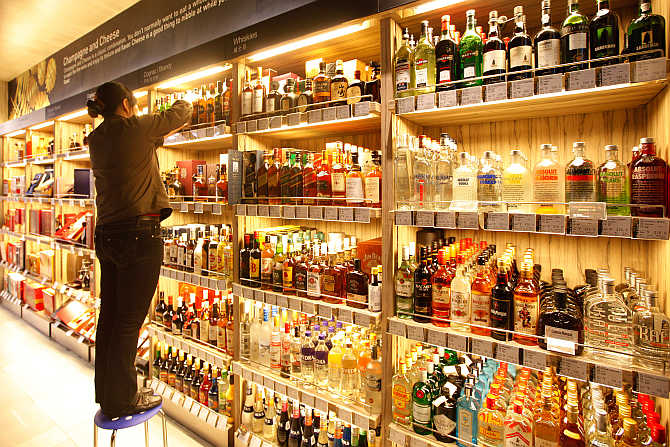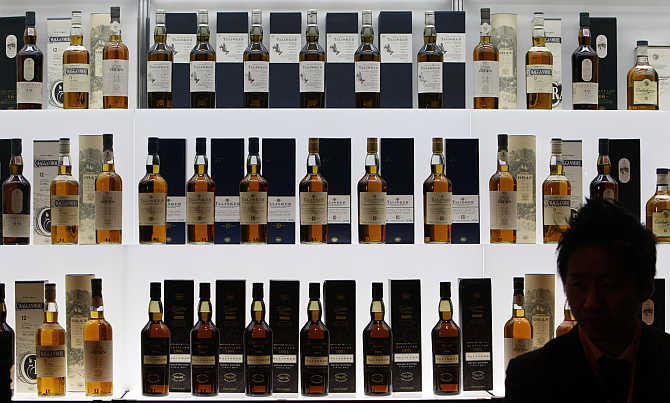Photographs: David Gray/Reuters Sushmi Dey in New Delhi
"Whenever someone asks me if I want water with my scotch, I say I’m thirsty, not dirty,” Joe E Lewis, American comedian and singer, once said.
Perhaps he was not the only one who preferred Scotch for its unadulterated taste.
The liquor now seems to be engulfed in a controversy as it has come under the scanner of Indian food inspectors.
Around 60 shipments of the imported spirit, including European Scotch whisky, are being held by the customs in New Delhi and Mumbai airports for allegedly violating India’s labeling requirements, it is learnt.
Please . . .
The image is used for representational purpose only
Scotch imports hit food-safety barrier, consignments held
Image: Under the Indian law, manufacturers are required to list the ingredients of a product on its label unless it is a single ingredient product.Photographs: David Moir/Reuters
Under the Indian law, manufacturers are required to list the ingredients of a product on its label unless it is a single ingredient product.
While scotch makers argue that all alcoholic beverages are made of one ingredient, the Food Safety and Standards Authority of India say scotch whisky consignments were held at the port because sampling found they contain ingredients such as added caramel, colour or some flavour, whereas the same were not listed in their labels.
“Consumers must know what is there in the bottles.
“Their (Scotch manufacturers) contention is that scotch should be deemed as single ingredient.
Please . . .
The image is used for representational purpose only
Scotch imports hit food-safety barrier, consignments held
Image: An employee arranges bottles of whisky at a supermarket.Photographs: Aly Song/Reuters
“Our law does not allow that.
“We have told them that products which contain other ingredients need to list them on the label.
“Even Codex, which is in line with international standards, does not deem scotch to be a single ingredient product,” FSSAI’s Chief Executive Officer Dillip Kumar Samantaray told Business Standard.
According to Samantaray, the matter has been reviewed by an independent scientific committee, which has found that scotch contains other ingredients and therefore the manufacturers need to print them on the label on bottles for consumer interest.
Please . . .
The image is used for representational purpose only
Scotch imports hit food-safety barrier, consignments held
Image: Bottles of malt whiskey are displayed at a whiskey merchandising event in Tokyo, Japan.Photographs: Issei Kato/Reuters
Scotch Whisky Association says scotch whisky is recognised in many markets as a ‘single ingredient product’.
“While the current import blockage is frustrating for both consumers and industry, with UK and EU support, we are continuing to have useful discussions with the FSSAI aimed at early resolution of the issue so that single ingredient products, such as scotch whisky, can enter the Indian market at the earliest,” Rosemary Gallagher, the association’s communications manager said in response to an e-mail query.
She said, “Given that the term ‘scotch whisky’ must appear on every bottle sold, there is no risk of consumer confusion as to what is being bought, and there is no need for such a restriction.”
FSSAI officials say the labelling norms are equal for all products entering the market, and labeling requirements will not be relaxed for any supplier.
Please . . .
The image is used for representational purpose only
Scotch imports hit food-safety barrier, consignments held
Image: A vendor shows a bottle of whisky.Photographs: Ali Jasim/Reuters
“If they are saying that ingredient labels are not required in many countries, there are also other countries where they are required.
“Moreover, Indian law requires this and therefore they need to declare it,” Samantaray emphasised.
FSSAI has also written to various ministries such as ministry of health and family welfare, ministry of commerce as well as ministry of external affairs, clearing its stand and providing them details of the review by scientific committee and results of the sampling.
The regulator has also discussed the matter with various stakeholders, including associations of wine makers and some other food product manufacturers.
“We are very clear in our stance.
Please . . .
The image is used for representational purpose only
Scotch imports hit food-safety barrier, consignments held
Image: Women dance and drink whisky.Photographs: Jorge Silva/Reuters
“If a product is non-compliant, we cannot allow it in the market.
“It can be anything -- Scotch, wine or chocolates. Labeling requirements under the law of the land need to be complied with,” Samantaray said.
The spat between the regulator and food product importers has been on for quite some time now.
At the end of last year, several containers of packaged food products, worth Rs 750 crore (Rs 7.5 billion) to 1,000 crore (Rs 10 billion), carrying imported chocolates, crispies, gourmet cheese, olive oil, noodles, pasta, jams, honey, oats and sauces, etc, were blocked by FSSAI at various ports and airports across the country for allegedly flouting labelling requirements.
Please . . .
The image is used for representational purpose only
Scotch imports hit food-safety barrier, consignments held
Image: A salesman arranges a display of whisky bottles in a liquor shop.Photographs: Kim Kyung-Hoon/Reuters
However, blocking of Scotch is also seen by many as a fallout of the ongoing tussle between India and the European Union.
Recently, EU banned the import of Alphonso mangoes and four other vegetables -- egg plant, taro plant, bitter gourd and snake gourd -- from India, citing the presence of pests such as fruit flies in them.
Reports suggested the Centre has taken up the issue and a European delegation is expected to visit India in September to review the situation.
The image is used for representational purpose only









article